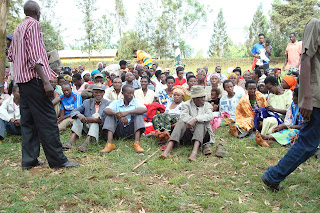The first project we visited is actually located in Kigali, not far from where I live actually. It is called Village of Hope and is run by the Rwanda Women Network and started out as a refuge for women that were victims of rape but survived the genocide. Many of these women had contracted HIV/AIDS since it was a strategy during the genocide that the men carrying this decease would be the ones raping the women so as to inflict as much damage as possible. A small piece of land was donated by the government and the women could come here with their children. It later developed to a sort of women’s shelter for women who were victims of both gender-based violence and rape. Women and the older children who have dropped out of school are trained in order to develop skills that could generate an income.


This is some of the things the women and children in the village has produced.

They also make money from baking bread that they sell to some of the schools in the area.
The second project we visited is situated in Kayonza district about two hours east from Kigali. First we met with the district authorities who are cooperating with the NGO’s on the projects. It was more of a courtesy visit but it was interesting to see how engaged and helpful these authorities are. It makes a big difference! After this meeting we continued to a village where an organization called AJPRODHO (a youth organization that works for human rights) have started a micron credit project. It’s a way to empower poor people on the country side that does not have access to the financial system so that they can get a chance to improve their lives. They create small groups which have to be made up out of at least 70% women. It is a well known fact that women are much better at paying back their loans then men in poor countries. I’m not going to get in to the discussion about why but this is a pattern that has been observed everywhere where this kind of projects have been organised.
These groups then sit down together and decide on a constitution that will set the rules for their activities. The principle is that they all have to save a certain amount every week that is place in a communal fund and after four weeks a number of the members get to borrow money that they can decide to do whatever they want with. After five weeks they have to pay the loan back with interest as in any bank. This particular group had decided that the minimum contribution per week should be 100 RwF (a little more than 1 SEK) which constitutes one share. One could buy a maximum amount of 4 shares per week and the amount they were allowed to borrow depended on the amount they had contributed every week. All members had small books where their transactions were written down so there would be no confusion. They had a small cash box where they collected all the money which had three locks with three different people in possession of the keys and a fourth who keep the box. A small amount of the savings is also put in a different social security fund which is used to help the people in the village who have more urgent needs.

We had lunch on the shore of Lake Muhazi. Across the lake on the opposite shore President Kagame has built a house. The view was very pretty but we had to wait over an hour for our food which delayed us significantly!



The book where they register their transactions. One stamp represents one share. It is done like this to make sure that everybody understands even if they can't read.
The final project was perhaps the most interesting one. It is run by AJPRODHO and deals with the issue of gender-based violence. It is a sensitization campaign that aims at raising awareness and change people’s opinions on the subject. In Rwanda gender-based violence is the most common crime and it is widely accepted as normal. We attended a village meeting where representatives of the organisation led the discussion and people were able to stand up and share their views. The most striking thing is that the discussion did not look very different from what it does in Sweden for example. A bit frightening since the context is so different. The discussion centred a lot on gender equality and most of the arguments were very familiar. What bothers me is that Sweden, which is supposed to be one of the most equal countries in the world, is still discussing the same issues as they do in a small poor village in Rwanda, a country which is light years away from Sweden on any equality index. It illustrates some disturbing features of the Swedish society I think. Anyway it was a very interesting experience!


When we arrived we were welcomed by women dancing and singing.

Inga kommentarer:
Skicka en kommentar